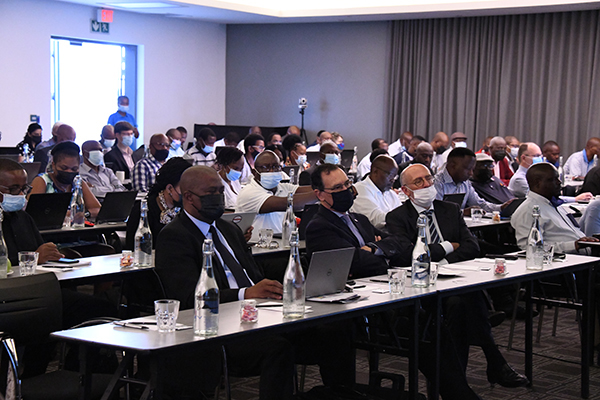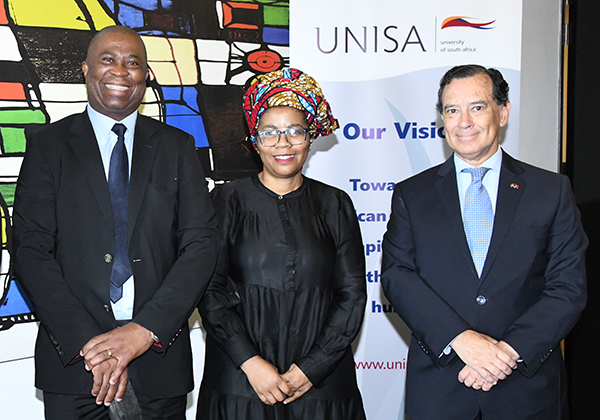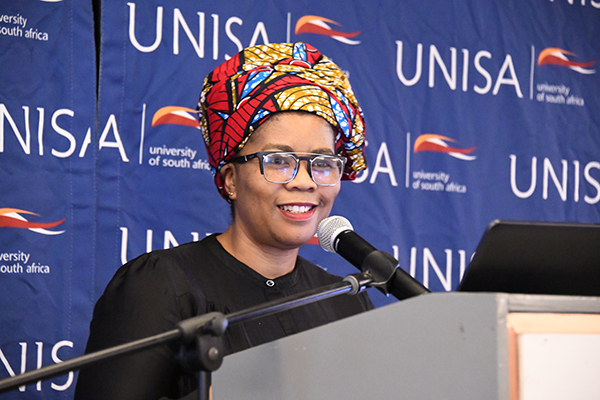News & Media
Reimagining African intellectual futures in the aftermath of Covid-19
Energised and committed to enhancing and realising the academic agenda, senior managers across all levels at Unisa, government executives and members of the diplomatic community are meeting at an all-inclusive Unisa Management Lekgotla on 11 and 12 March 2022, themed ‘Reclaiming and reimagining African intellectual futures in the aftermath of the Covid-19 pandemic’.

Representatives from Unisa’s senior and middle-management and institutional structures, government executives and members of the diplomatic community
The purpose of the Lekgotla is to, with inputs from external contributors, assess the progress and challenges on key priority areas identified, and to reflect on the institution’s support environments and services.
In her welcome address, Professor Puleng LenkaBula, Principal and Vice-Chancellor (VC) of Unisa, said that Unisa hit the ground running for the 2022 academic year, energised and even more committed to enhancing and realising the academic agenda guided by the goal to reimagine Unisa in the aftermath of the Covid-19 pandemic. In the uncharted Covid-19 waters, said the VC, there is a need to learn to be resilient and sustainable. Against this backdrop, the VC posed the question: “How do institutions of learning such as Unisa shape knowledge, and create strategies and ideas that can resource our state and continental decisions and choices through knowledge and research?”
She stressed further that, globally, the higher education landscape looks different today than it did before Covid-19, and will continue to change, “Therefore, we need not be complacent about the role that we should be playing,” said the VC. “I must commend all of you for the academic, administrative, and professional accomplishments we have recently witnessed as a university. The numbers in different rankings are beginning to show an upward trend and it is all because of your commitment to the work of the university. I hope that in the next few years, we will work towards being on the top five.”
Living in times of uncertainty
Addressing the need to reimagine a sustainable Unisa, the VC said that since we are living in times of uncertainty brought about by changes in the political, economic, social, and technological environments, Unisa is adapting and making efforts to work smart to create a future that aligns with the idea of reclaiming and reimagining African intellectual futures in the aftermath of the Covid-19 pandemic. “We are hoping that this reimagination will inspire us to learn from our past, as we do from our present, and to imagine the future with great determination, courage and resilience,” the VC said.
The VC addressed in detail the changing role of universities, and the nature and ownership of knowledge production in the 21st century, but equally the changing roles of student support, staff management and financial positions for institutional efficiency. These, according to the VC, are important aspects in reimagining the role of universities after the pandemic.
“I'd like to invite us to exercise our leadership under these challenging circumstances at the global, regional and national level, including in our institution,” said the VC. She encouraged the university leadership to partner with her to work on ensuring that they support the academic programme and the areas of success of the university. “I would also like you to partner with us in ensuring that we demonstrate our talents and expertise to ensure that Unisa is known for key knowledge areas that are important, including, but not limited, to the ten catalytic niche areas, which remain the centrepiece of our work as Unisa,” said the VC.
Some of the key knowledge areas that the VC identified upon assuming office are the ODeL model and its implications for the future, student success rates and analytics, digitalisation, and the 4th Industrial Revolution. “These are the areas that will make us stand out and share our unique position in the world and also in the teaching,” she concluded.
Upskilling Africa and Africans

From left to right: Dr Phil Mjwara, Director-General of the Department of Science and Innovation, Prof Puleng LenkaBula, Principal and VC of Unisa, and His Excellency, Manuel Carvalho, Ambassador of Portugal to the Republic of South Africa
His Excellency, Manuel Carvalho, Ambassador of Portugal to the Republic of South Africa, addressed the VC’s comments about reimagining African intellectual futures in the aftermath of Covid-19 by asserting that one way to respond to the reimagination is through upskilling South Africa and South Africans, and Africa and Africans. Addressing the Lekgotla on perspectives of higher education in Portugal, Carvalho noted that the Portuguese higher education system grew from 30 000 students in the sixties to nearly 400 000 students by the end of the 20th century, with the female population representing over 60% of the total number of students enrolled in the Portuguese tertiary education system. He explained that the higher education service is provided through a diversified system of institutions, including universities and polytechnic institutes. Carvalho shared that higher education systems should be designed to forge economic growth and reskilling, and leave no one behind.
Dr Phil Mjwara, Director-General of the Department of Science and Innovation, encouraged Unisa to continue investing in knowledge. Sharing South Africa’s research agenda, he agreed with the VC’s call to reimagine Unisa’s role after the Covid-19 pandemic. “In 2019,” he said, “there was a white paper that asked us to start thinking about shifting the lack of an international system of innovation so that we can derive maximum impact in our research agenda and global developments in the knowledge arena.”
Mjwara stressed that we need to have an innovation system that enables inclusive development and sustainability in a world that we know is changing. He encouraged Unisa to align its contributions in the local and global knowledge arena with government’s efforts to produce, manage and utilise knowledge that will help enhance the quality, quantity and diversity of the higher education system in South Africa.
Going forward

"I would like you to partner with us in ensuring that we demonstrate our talents and expertise to ensure that Unisa is known for key knowledge areas that are important." - Prof Puleng LenkaBula, Unisa Principal and VC
Covid-19 cast a harsh light on the vulnerabilities and challenges in higher education. It provided a clear picture of existing gaps, and a clearer picture of what steps need to be taken forward to ensure the sustainability of universities. Among some of Unisa's efforts to reimagine itself, the university intends to continue committing to strengthen education as a common good.
Under the spotlight during the rest of the jam-packed programme, which extends into the weekend, will be perspectives from stakeholders, Unisa’s place in the world, ways in which to catalyse the academic programme and strategies to optimise support environments and services.
The outcomes of this milestone Lekgotla will be communicated to the Unisa community and the university’s stakeholders on relevant platforms in the near future.
*By Tshimangadzo Mphaphuli, Senior Journalist, and Philip van der Merwe, Editor: External Publications, Department of Institutional Advancement
Publish date: 2022/03/11

 Unisa co-hosts G20 community outreach in the Eastern Cape
Unisa co-hosts G20 community outreach in the Eastern Cape
 Unisans gain membership of prestigious science academies
Unisans gain membership of prestigious science academies
 Advocating for disability transformation through servant leadership
Advocating for disability transformation through servant leadership
 Unisa Press continues to illuminate the publishing space
Unisa Press continues to illuminate the publishing space